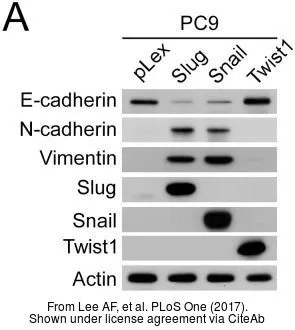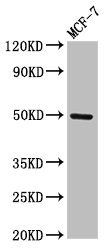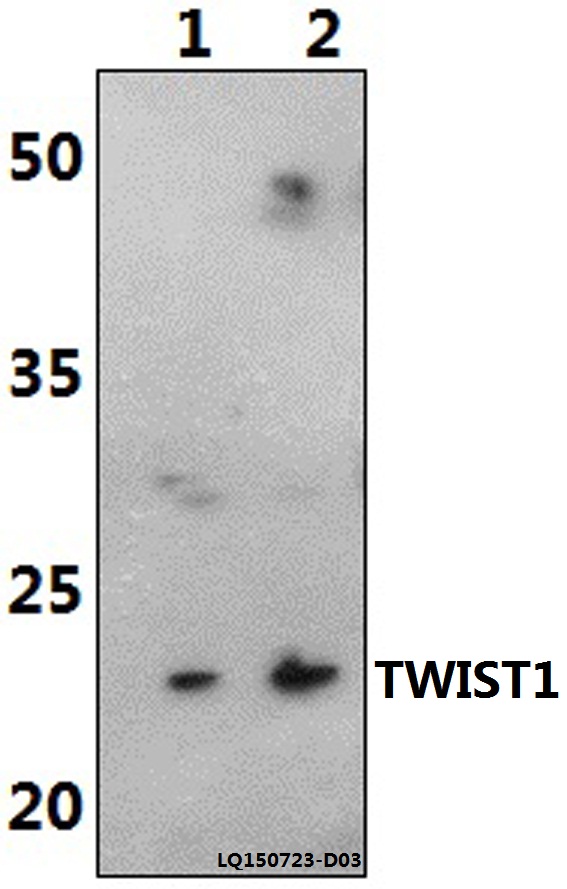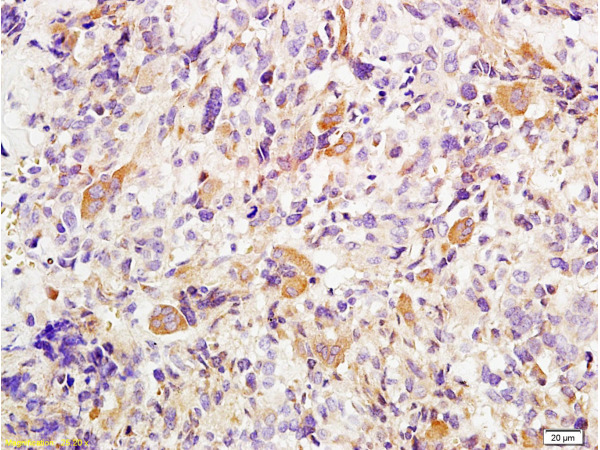![Twist1 antibody [N1C3] detects Twist1 protein by Western blot analysis. A. 30 μg HeLa whole cell lysate/extract B. 30 μg whole cell lysate/extract of Flag-human TWIST1-transfected HeLa cells 12 % SDS-PAGE Twist1 antibody [N1C3] (GTX100621) dilution: 1:10000 Twist1 antibody [N1C3] detects Twist1 protein by Western blot analysis. A. 30 μg HeLa whole cell lysate/extract B. 30 μg whole cell lysate/extract of Flag-human TWIST1-transfected HeLa cells 12 % SDS-PAGE Twist1 antibody [N1C3] (GTX100621) dilution: 1:10000](https://www.genetex.com/upload/website/prouct_img/normal/GTX100621/GTX100621_41087_WB_B_w_23060100_423.webp)
Twist1 antibody [N1C3] detects Twist1 protein by Western blot analysis. A. 30 μg HeLa whole cell lysate/extract B. 30 μg whole cell lysate/extract of Flag-human TWIST1-transfected HeLa cells 12 % SDS-PAGE Twist1 antibody [N1C3] (GTX100621) dilution: 1:10000
Twist1 antibody [N1C3]
GTX100621
ApplicationsWestern Blot
Product group Antibodies
ReactivityHuman
TargetTWIST1
Overview
- SupplierGeneTex
- Product NameTwist1 antibody [N1C3]
- Delivery Days Customer9
- Application Supplier NoteWB: 1:5000-1:20000. *Optimal dilutions/concentrations should be determined by the researcher.Not tested in other applications.
- ApplicationsWestern Blot
- CertificationResearch Use Only
- ClonalityPolyclonal
- Concentration1 mg/ml
- ConjugateUnconjugated
- Gene ID7291
- Target nameTWIST1
- Target descriptiontwist family bHLH transcription factor 1
- Target synonymsACS3, BPES2, BPES3, CRS, CRS1, CSO, SCS, SWCOS, TWIST, bHLHa38, twist-related protein 1, B-HLH DNA binding protein, H-twist, TWIST homolog of drosophila, class A basic helix-loop-helix protein 38, twist basic helix-loop-helix transcription factor 1, twist homolog 1
- HostRabbit
- IsotypeIgG
- Protein IDQ15672
- Protein NameTwist-related protein 1
- Scientific DescriptionBasic helix-loop-helix (bHLH) transcription factors have been implicated in cell lineage determination and differentiation. The protein encoded by this gene is a bHLH transcription factor and shares similarity with another bHLH transcription factor, Dermo1. The strongest expression of this mRNA is in placental tissue; in adults, mesodermally derived tissues express this mRNA preferentially. Mutations in this gene have been found in patients with Saethre-Chotzen syndrome. [provided by RefSeq]
- ReactivityHuman
- Storage Instruction-20°C or -80°C,2°C to 8°C
- UNSPSC41116161








